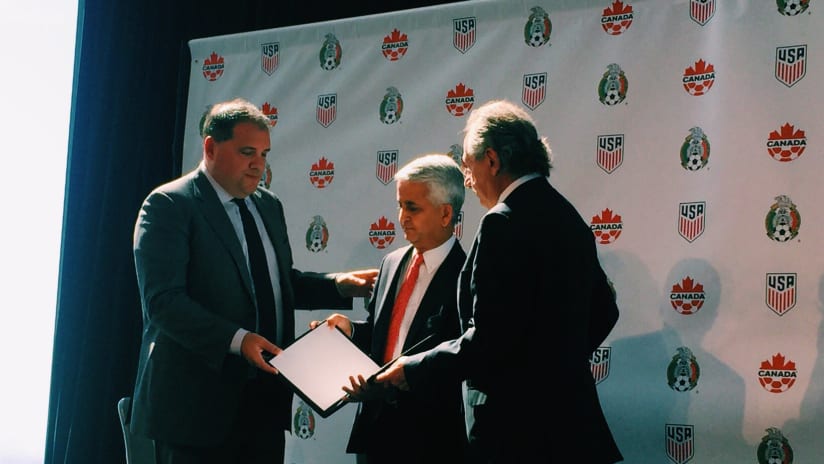NEW YORK – The US could have taken its chances and gone at it alone. Mexico and Canada could have done the same. In the end, they all came together for the benefit of the region.
The soccer federations of the three countries officially joined forces on Monday afternoon to announce that they were launching a historic bid to win the hosting rights of the 2026 World Cup.
Rumors in recent years held that all three North American nations wanted to land the tournament in their own backyards. But rather than compete against one another for the privilege of hosting FIFA’s most distinguished competition, they instead opted to unite in an effort to strengthen their chances, heads of each federation said.
“There are times in life when you have to keep your [selfishness] tight and in a closed box,” said Mexican federation president Decio de Maria following a formal press conference at the One World Observatory. “I think that trying to get in a football war of, ‘Fine, you’re going to do it alone, I’m going to do it alone and Canada [too],’ is a stupid thing.
“I think wise people should be able to sit in a room and find a solution. All of Canada and Mexico understand that the US doesn’t need us to put together a bid, but find out that they would like to have us as part of this bid.”
Canada Soccer Association and CONCACAF president Victor Montagliani added that the idea of joint bid was tossed around as far back as seven or eight years ago. It is unclear who contacted whom to start the negotiations, but no doubt talks were hastened by the fact that the region has not hosted a World Cup since the US in 1994.
“If you have a 90 percent or whatever the numbers are – I’m not saying it’s 90 percent – of getting 75 percent of the tournament or 75 percent chance of getting 100 percent, what do you do?” Sunil Gulati, president of U.S. Soccer, said. “That was part of the analysis and calculus.”
The division of games being shared for the first World Cup with 48 teams immediately sparked debate. The bid upon which the three countries agreed would see the US host 60 matches, while Mexico and Canada get 10 apiece.
“I think the key principles in that discussion were we felt we should host the lion’s share of games, and if we went alone we had potentially the strongest bid,” said Gulati. “So I think both Mexico and Canada had then to assess the same thing, what the likelihood [was] and so on....
“There was a lot of negotiation about it. At different numbers, one or more of us may have chosen to bid alone.”
Ultimately, the figures worked for all three parties and they came to an agreement. De Maria said he was looking at the bigger picture when he made the deal.
“I know most of the people, they would like to have more," he said. "In the end, I think the important part of this was that we were able to sit together and get a negotiation between the countries, find a solution, and send a message to the world of football and to the rest of the world that we are a confident and trustworthy and we can put together a great World Cup. I think that is an important message.”
Montagliani echoed these sentiments.
"I think you need to step back and say, ‘This is a World Cup for us, the region. What’s the best for the World Cup?’" he said. "This is where we came to a landing."














